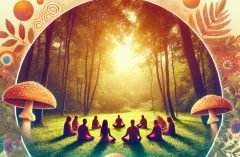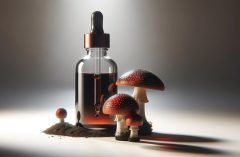Table of Contents

But what exactly happens in the brain when psilocybin is consumed? And how does it help alleviate symptoms of these mental health conditions? Let’s explore the science behind psilocybin, its profound effects on the brain, and its potential to revolutionize mental health treatment.
The History of Psilocybin: From Ancient Use to Modern Medicine
Psilocybin’s journey from ancient ritualistic use to modern medicine is as fascinating as the compound itself. Indigenous cultures, particularly in Central and South America, have long used magic mushrooms in spiritual and healing ceremonies. The Mazatec people of Mexico, for example, used psilocybin to connect with the divine and treat various physical and mental ailments. These ceremonies were central to their culture, blending the mystical and medicinal properties of psilocybin.
In the 1950s and ‘60s, magic mushrooms gained attention in the West when R. Gordon Wasson, a banker and amateur mycologist, participated in a traditional Mazatec ceremony and documented his experience in Life magazine. His account sparked curiosity among researchers, and figures like Timothy Leary soon began exploring psilocybin’s potential for expanding consciousness and treating psychological disorders. However, psilocybin’s rise was abruptly halted with the War on Drugs in the 1970s, leading to its prohibition and a decades-long pause in serious scientific research.
How Psilocybin Affects the Brain

1. Increased Neural Connectivity
One of the most significant discoveries about psilocybin is its ability to increase neural connectivity. Under normal conditions, the brain operates in a highly organized network where different regions serve distinct functions. Psilocybin disrupts this typical network and promotes increased communication between regions of the brain that don’t usually interact. This temporary reorganization allows for enhanced creativity, heightened emotional responses, and sometimes deep personal insights during a psilocybin trip.
2. Decreased Default Mode Network (DMN) Activity
Psilocybin’s effects on the default mode network (DMN) are also central to its mental health benefits, modern science has found. The DMN is associated with self-referential thoughts—the kind that occur during daydreaming or self-reflection. Overactivity in the DMN is linked to mental health conditions like depression and anxiety, where individuals become trapped in repetitive, negative thought loops. Psilocybin dampens DMN activity, essentially “resetting” the brain and allowing new thought patterns to emerge. This reduction in DMN activity is what many researchers believe helps alleviate the symptoms of mental health conditions.
Psilocybin and Mental Health Benefits
Psilocybin’s effect on neural connectivity and DMN activity makes it a promising treatment for a variety of mental health disorders. Below are some of the most promising areas of science research:
1. Depression
Psilocybin is being hailed as a breakthrough treatment for depression, especially in individuals with treatment-resistant depression. In the science of human clinical trials, patients who received psilocybin-assisted therapy reported a significant reduction in depressive symptoms, with some effects lasting for months after just one or two sessions. Unlike traditional antidepressants that increase serotonin levels, psilocybin reorganizes neural pathways, allowing individuals to break free from the rigid thought patterns that often contribute to depression. Further research on depression and psilocybin can be found here.
2. PTSD
For individuals suffering from post-traumatic stress disorder (PTSD), psilocybin’s impact on the DMN can help them confront and process traumatic memories. By reducing the hyperactivity associated with these traumatic memories, psilocybin enables individuals to approach their past from a more detached, less emotional perspective. This allows for significant emotional healing and long-lasting relief from PTSD symptoms. Explore psilocybin’s effects on PTSD further.
3. Anxiety
Psilocybin is particularly effective for those facing end-of-life anxiety or existential dread, especially in individuals with terminal illnesses. During a psilocybin experience, many users report feelings of ego dissolution, where the boundaries of the self dissolve, leading to a sense of unity with the universe. This can help reduce death anxiety, allowing terminal patients to find peace with their circumstances and improve their quality of life in their final months.
Psilocybin vs. Traditional Treatments: A New Frontier?

While psilocybin treatment is still in its infancy, its potential as a revolutionary therapy for mental health disorders is clear. As more studies are conducted, psilocybin could become a standard option for individuals who haven’t responded well to the science of traditional therapies.
The Legal Status of Psilocybin: Where Are We Now?
While psilocybin’s therapeutic potential is becoming more evident, its legal status remains complex. In many parts of the world, including the United States, psilocybin is classified as a Schedule I drug, meaning it is illegal to possess, distribute, or use. However, recent developments in regions like Oregon, which became the first U.S. state to legalize psilocybin for therapeutic use in 2020, signal a shift toward wider acceptance. Similarly, cities like Denver and Oakland have decriminalized the substance, allowing for controlled research and therapy.
As more positive clinical data emerges, advocates for psilocybin hope to see further decriminalization and legalization, particularly for therapeutic purposes. This growing movement suggests that psilocybin could eventually follow in the footsteps of cannabis, transitioning from an illegal substance to a recognized tool in mental health treatment.
Psilocybin in Popular Culture and Wellness
The reemergence of psilocybin in popular culture has helped reduce stigma and generated curiosity about its benefits. Documentaries like Fantastic Fungi and podcasts such as The Joe Rogan Experience have brought psilocybin into mainstream wellness discussions. Increasingly, individuals are exploring psychedelics not just for mental health treatments, but also for personal growth, creativity, and spiritual exploration. The rise of microdosing, where users take very small doses of psilocybin to boost productivity and creativity without experiencing full-blown hallucinations, reflects this shift toward seeing psychedelics as a tool for enhancing well-being rather than just a recreational substance.
Conclusion: A Promising Future for Psilocybin
The science behind psilocybin paints an exciting picture of its potential to revolutionize mental health treatment. By interacting with serotonin receptors, reducing default mode network activity, and increasing neural connectivity, psilocybin offers a novel way to treat conditions like depression, PTSD, and anxiety. While the road to widespread legalization and acceptance is still long, the progress made so far shows great promise.
As psilocybin continues to gain momentum in science research as well as in the popular culture, it may very well become a cornerstone in the future of mental health treatments, providing lasting relief for millions of people worldwide.
Suggested Further Reading:
1.Johns Hopkins Psilocybin Research – A leading source for clinical trials and research on psilocybin’s effects on mental health.
2.MAPS – Psilocybin and PTSD – Learn more about the research into psilocybin-assisted therapy for PTSD.
3.Harvard Health on Psychedelics and Mental Health – An in-depth look at how psychedelics, including psilocybin, are being researched for mental health treatments.





